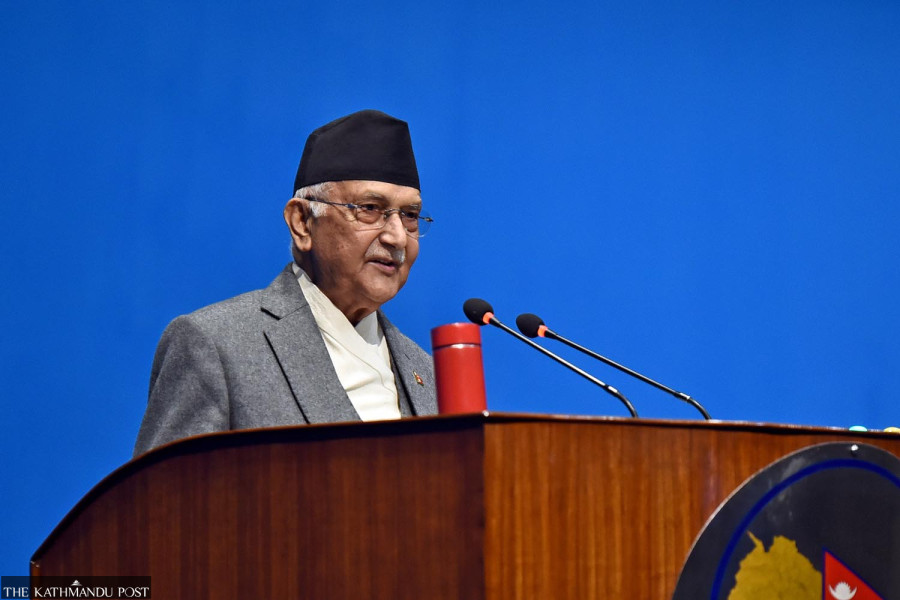Politics
PM Oli declines to answer lawmaker’s ‘offensive’ questions
In another unusual event, upper house passes a motion regretting a lower house member’s criticism of its affairs.
Binod Ghimire
On Sunday, two unusual events unfolded in the federal parliament: Prime Minister KP Sharma Oli declined to answer questions from a House of Representatives member, while the National Assembly passed a motion of regret against a lower house member.
As scheduled, Oli appeared before the lower house for the question-answer session with lawmakers. He was supposed to answer the concerns of 10 members who had submitted their queries a few days in advance.
After nine lawmakers, Prabhu Sah of the Aam Janata Party presented a set of questions which ranged from capital flight, the plight of Nepali migrant workers and the prime minister’s potential India visit to the lack of majority in the Assembly to pass the ordinances. However, Oli chose not to answer them, calling them full of “hatred, outrage and offense”.
In every point, Sah questioned the government’s capacity and asked on what moral ground Oli was continuing as prime minister while even his coalition partners opposed the ordinances.
“Nepali workers abroad are not granted trade union rights. Why did you sign labour agreements that exclude these rights? In the 21st century, what and how much benefit have you gotten for putting Nepali workers in exploitative and inhumane conditions?” Sah had asked.
Seemingly offended by the questions, Oli refused to answer any of Sah’s queries.
Talking to the media after the House meeting, Sah said Oli had undermined the House by refusing to answer him.
“He insulted Parliament,” Sah said. “He disrespected parliamentary rules. He completely undermined the question-answer session. This is a mockery of the rule of law. In a democracy, those in power must be answerable to people’s representatives.”
Sah even claimed that the essence of the question-answer session was lost on Sunday.
Experts on parliamentary affairs, however, don’t solely blame Oli for Sunday’s incident. They say facts, not prejudice, must back the lawmakers’ questions.
“Parliament is considered a wise man’s place. Lawmakers should maintain the decorum of the House and present questions with dignity,” said Som Bahadur Thapa, a former secretary at the parliament secretariat.
“That said, the prime minister cannot run away from questions. The executive must be answerable to the legislature. Instead of refusing to answer, the prime minister could have asked lawmaker Sah to conduct proper research and present questions with facts, and not just level accusations.”
Rajendra Phuyal, former secretary of the National Assembly, said while it is true that lawmakers must frame questions maintaining the dignity of the House, Oli did more harm than good by refusing to respond.
“It is said you can expect quality answers when you pose quality questions,” he said. “There were multiple ways to answer Sah’s concerns. I don’t think it was right to skip the questions. The executive should be answerable to the House.”
It was not just the lower house’s question-answer that surprised the experts. The decision of the upper house to pass a motion of regret against Gyan (Gyanendra) Bahadur Shahi, Rastriya Prajatantra Party chief whip in the lower house, also came as a shocker to them.
Criticising the endorsement of the Media Council Bill by the upper house last week, Shahi had claimed the upper chamber had turned out to be no more than an old-age home to adjust grandparents. Taking to Facebook, Shahi even claimed there was no need to give continuity to “the useless House”.
Criticising his statement, the House not just passed a regret motion against Shahi but also warned him not to repeat such incidents.
“Without properly studying the reality of the passed bill, the honourable member made baseless, false and misleading remarks about the proceedings of another House, as well as about the qualifications, competence, and age of its honourable members, in an extremely irresponsible manner. The House expresses regret over this statement and directs him to ensure that he makes thoughtful, objective and fact-based remarks in the future,” read the motion.
Experts say a House has the right to study if it feels some incident has undermined its prerogative. “But I don’t remember any House endorsing a motion against a lawmaker from the other House,” said Phuyal. “I found it unusual.”




 10.12°C Kathmandu
10.12°C Kathmandu















